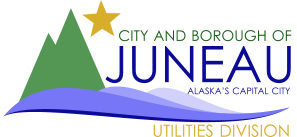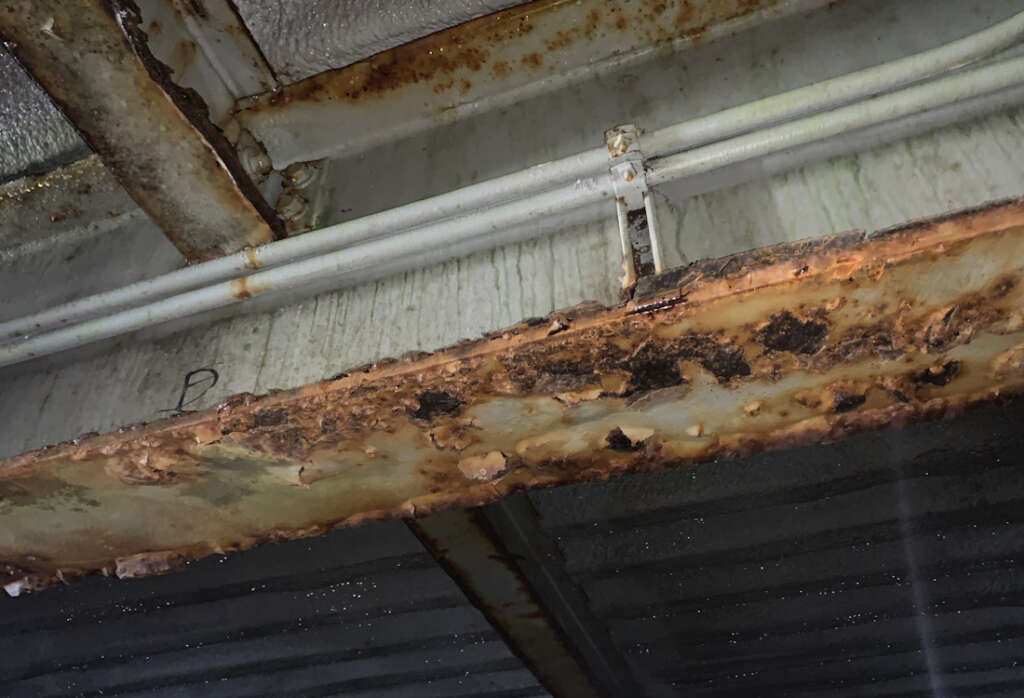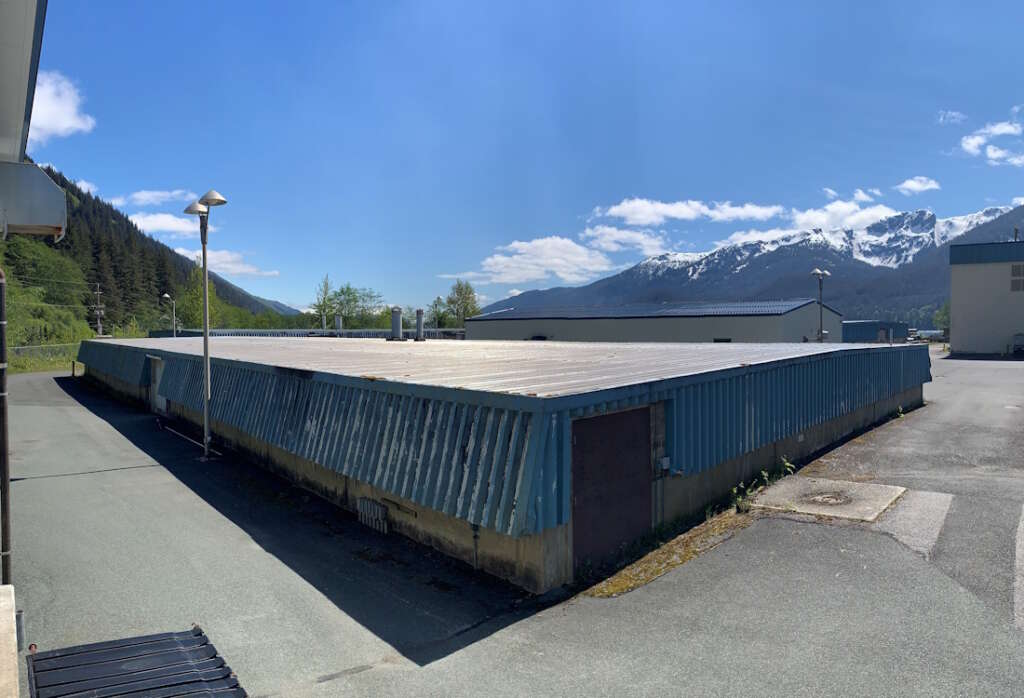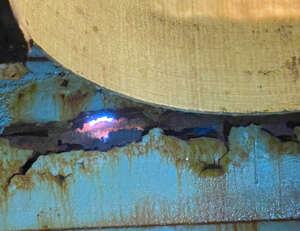Proposition 3 – Passed
Clarifier Building Reconstruction at the Juneau Douglas Wastewater Treatment Plant
Photos above show the interior and exterior condition of the clarifier building at the Juneau-Douglas Wastewater Treatment Plant
About the CBJ Wastewater Utility
The residents, businesses, and visitors in the City and Borough of Juneau are serviced by approximately 7,100 sewer connections via a network of roughly 140 miles of pipes and 45 lift stations known as the Collections System. The sewer collection lines convey the flow to one of the three treatment plants – the Juneau-Douglas Wastewater Treatment Plant (WWTP), the Mendenhall WWTP, or Auke Bay WWTP. Through this network, the CBJ Wastewater Utility processes nearly 3.3 million gallons per day (MGD) or roughly 1.2 billion gallons of water annually. Operations and water quality at the treatment plants and connected infrastructure are heavily regulated by the US Environmental Protection Agency, Alaska Department of Environmental Conservation, the Centers for Disease Control among others.
Frequently Asked Questions
A. Proposition No. 3 will authorize the issuance of $10,000,000 in general obligation bond debt to reconstruct the wastewater clarifier building at the Juneau-Douglas Wastewater Treatment Plant that services Thane, Downtown and Douglas and is a key component of CBJ’s systemwide wastewater treatment operations.
Clarifiers are a vital part of wastewater treatment plants and critical to ensuring that treated sewage meets environmental standards before discharge. The clarifier at the Juneau-Douglas Wastewater Treatment Plant is a large settling tank that mechanically separates suspended solids from liquid effluent through a settling process to achieve the desired purity of treated wastewater. Without a functional clarifier, CBJ could not meet environmental and public safety standards for wastewater discharge into Gastineau Channel from the Juneau-Douglas Wastewater Treatment Plant. It would also cause violations of our wastewater permit.
A. The 50-year-old wastewater plant’s clarifier building is nearing the end of its designed lifespan and needs significant and time-sensitive structural improvements due to age and corrosion caused by the unique and highly corrosive wastewater treatment conditions and the adjacent saltwater environment. Insufficient mechanical ventilation systems are accelerating this corrosion. If not addressed, increasing levels of corrosion will lead to structural failure which will prevent our teams from safely accessing and operating a critical part of the treatment process.
The proposed bond would fund the replacement of the metal building enclosure, including the roof and all structural steel (walls, beams, columns) as well as the mechanical ventilation system and other necessary electrical improvements at the facility. These upgrades will use corrosion-resistant materials and ventilation designs to prevent further corrosion and extend the life of the clarifier equipment as well as the building to ensure continuity of this critical public service for another 50+ years.
A. The Utility does not currently receive any proceeds from property tax revenues.
If Proposition No. 3 passes, the bond would be paid for with the debt service component of the property tax mill rate.
A. There are several complex factors which determine your property tax bill including the assessed value of a property and the annual property tax rate, of which the debt service mill rate is a part. The FY2025 property tax mill rate (property values set as of January 1, 2024) is 10.04. The debt service component of that rate is 1.08.
CBJ has substantial debt capacity to support this project and others without raising the debt service mill rate as many large projects are being paid off in the coming years. If this bond issuance is approved, the debt service portion of the property taxation (mill) rate will not increase. More about the debt service and property tax mill rate is available at www.juneau.org/budget.
A. Not currently. Voter-approved sales tax has periodically been designated to support capital projects for the Utility in the past; however, no utility capital projects are currently being funded through sales tax revenues. CBJ Utility maintenance and infrastructure improvements were last supported by the 1% sales tax in FY 2024. Voters will next consider the 1% temporary sales tax and the projects it would fund in the fall 2027 (FY 2028) to be effective for a five-year term starting October 1, 2028.
A. The CBJ Wastewater Utility operates the treatment plants and 45 sewer lift stations connected by 140 miles of pipes and 7100 service connections to treat approximately 1.2 billion gallons of wastewater every year. Built in the 1960s and 1970s, much of this complex infrastructure is reaching the end of its service life or requires upgrades to meet evolving building codes, operational standards, and regulatory requirements. The Utility has made systematic improvements where possible, however recent rate increases have not keep pace with inflation and are not sufficient to sustain the infrastructure investments needed.
The Utility worked with an independent structural engineering firm to assess the structures at the Juneau-Douglas Treatment plant. Their analysis found that the clarifier building needs time-sensitive structural reconstruction to ensure the operational safety and functionality of the facility. CBJ is requesting voter approval of a $10 million bond to decrease the financial impact to ratepayers via utility rate increases. CBJ’s current debt capacity allows for the proposed bond issuance without requiring an increase to the debt service portion of the property tax mill rate.
A. Similar to communities across the U.S., much of Juneau’s water utility infrastructure was built in the 1970’s following the implementation of the U.S. EPA Clean Water Act with an anticipated lifespan of 40-50 years. While CBJ continues to effectively maintain and improve these facilities where possible, significant investments are required to replace and update the 50-year-old utility infrastructure to present-day operational standards.
The CBJ Utilities Division, with guidance from the public Utilities Advisory Board and approval by the Assembly, is making strategic facility upgrades and deferred maintenance that will improve utility operations and replace aging infrastructure. CBJ is evaluating – and pursuing where relevant – all available funding options to support these efforts, including Marine Passenger Fees, state and federal grants, and Alaska Department of Environmental Conservation state revolving loan funding programs.
A 2% utility rate increase went into effect on July 1, 2024. This revenue supports the increased operation and maintenance costs of Juneau’s major water and wastewater infrastructure systems, debt financing from Alaska Department of Environmental Conservation (ADEC) loans, and capital projects directed at aging infrastructure and regulatory compliance. However, future rate increases are anticipated to address significant infrastructure backlog needs and inflationary pressures. Proposition No. 3 would reduce the rate and amount of the future increases required.
CBJ is currently conducting a comprehensive rate study to understand and plan for future capital, operational, and maintenance expenses. The last rate study was published in 2014. The previous study and more information about historical rate increases is available at https://juneau.org/engineering-public-works/utilities-division/.
A. Independent structural engineers have identified the proposed clarifier building project as essential to the safety and functionality of the Juneau-Douglas Wastewater Treatment plant serving a significant portion of Juneau’s population. CBJ is committed to moving forward with the project to ensure the continuity of this core service to the community.
If the bond does not pass, the Utility will seek rate increases of a magnitude big enough to cover the cost of the project, or defer other critical infrastructure projects.
Additional Questions?
Contact CBJ Utilities Superintendent, Brian McGuire at [email protected].
Looking for information about the municipal election? Visit juneau.org/clerk/elections.
More Resources
Election Results – October 2024
- View the full certified election results from the October 1, 2024 CBJ Regular Municipal election.
-
- Read the Full Ordinance 2024-26 describing the project’s purpose and authorizing Proposition No. 3.
Public Meetings:
- July 11, 2024: Utility Advisory Board Meeting
- Link: Meeting Materials
- July 01, 2024: Regular Assembly Meeting
- June 18, 2024: Systemic Racism Review Committee Meeting
- Link: Meeting Materials
- June 17, 2024: Regular Assembly Meeting
- June 3, 2024: Assembly Committee of the Whole
Plant Location



